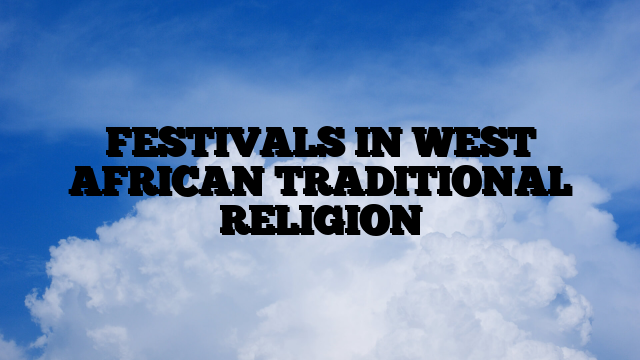Introduction
Festivals hold a significant place in the West African traditional religion. They are an occasion for the community to come together, celebrate, and honor their ancestors and deities.
West African Traditional Religion encompasses a diverse set of beliefs and practices, with various festivals being celebrated throughout the year. Here are some examples of festivals in West African Traditional Religion:
- Odun Olojo: This festival is celebrated by the Yoruba people of Nigeria and marks the beginning of the new year. It is a time to honor the god of creation and seek his blessings for the coming year.
- Homowo: This festival is celebrated by the Ga people of Ghana and Togo to commemorate a time of famine in their history. The festival involves the consumption of a special dish made from mashed yam and palm oil, as well as dancing and drumming.
- Dipo: This festival is celebrated by the Krobo people of Ghana to initiate young girls into womanhood. The girls are adorned in traditional clothing and perform dances to showcase their readiness for marriage.
- Sango Festival: This festival is celebrated by the Yoruba people of Nigeria to honor Sango, the god of thunder and lightning. It involves drumming, dancing, and the sacrifice of animals.
- Osun-Osogbo Festival: This festival is celebrated by the Yoruba people of Nigeria to honor Osun, the goddess of fertility and water. It involves a procession to the Osun-Osogbo Sacred Grove, where offerings are made to the goddess.
- Egungun Festival: This festival is celebrated by the Yoruba people of Nigeria to honor their ancestors. It involves the dressing up in elaborate costumes and masks to perform dances and pay homage to the spirits of the dead.
Types of Festivals
West African Traditional Religion is diverse and complex, with various types of festivals that are celebrated to honor ancestors, deities, and other spiritual beings. Here are some of the types of festivals in West African Traditional Religion:
- Ancestral Festivals: These festivals are held to honor the ancestors and seek their blessings. They are often celebrated at the beginning of the planting season, harvest, and other significant occasions. During these festivals, offerings of food and drink are made to the ancestors, and traditional dances and rituals are performed.
- Harvest Festivals: These festivals are held to give thanks to the deities and spirits for a bountiful harvest. They are usually celebrated at the end of the planting season, and offerings of food and drink are made to the deities. Traditional dances and rituals are also performed to show gratitude.
- Initiation Festivals: These festivals mark the initiation of young people into adulthood or membership in a particular society or group. They are usually accompanied by rituals and dances, and offerings of food and drink are made to the deities.
- New Yam Festivals: These festivals are held to celebrate the beginning of the yam harvest season. They are usually accompanied by traditional dances and rituals, and offerings of yams and other food items are made to the deities.
- Mask Festivals: These festivals are characterized by the use of masks to represent various deities and spirits. They are often celebrated to appease the deities and seek their blessings for the community.
- Sacred Grove Festivals: These festivals are held to honor the spirits and deities that reside in sacred groves. They are usually accompanied by traditional dances and rituals, and offerings of food and drink are made to the deities.
The significance of festivals
Festivals are an essential aspect of West African Traditional Religion. They are significant cultural and religious events that play a central role in the lives of the people. Here are some of the reasons why festivals are essential in West African Traditional Religion:
- Celebration of Ancestors: Festivals provide an opportunity for the community to pay homage to their ancestors. The ancestors are believed to be the guardians and protectors of the community, and therefore, it is crucial to celebrate them. The festival includes various rituals such as libations, offerings of food, and dancing in honor of the ancestors.
- Renewal and Purification: Festivals serve as a time of renewal and purification for the community. The rituals and ceremonies performed during the festivals are believed to cleanse the community of negative energy, such as illness and misfortune, and bring about positive energy, such as good health and prosperity.
- Strengthening of Community Bonds: Festivals provide an opportunity for the community to come together and strengthen their bonds. People from different parts of the community gather to celebrate, share food and drink, and participate in communal activities.
- Education and Transmission of Culture: Festivals are also significant in West African Traditional Religion because they serve as a means of education and the transmission of culture. The rituals and ceremonies performed during the festivals are often passed down from generation to generation, helping to preserve the cultural traditions of the community.
- Recognition of Deities: Festivals also provide an opportunity to recognize and honor the deities that are central to West African Traditional Religion. The deities are believed to be responsible for various aspects of human life, such as fertility, prosperity, and health. The rituals and ceremonies performed during the festivals are designed to appease these deities and ensure their continued support for the community.



